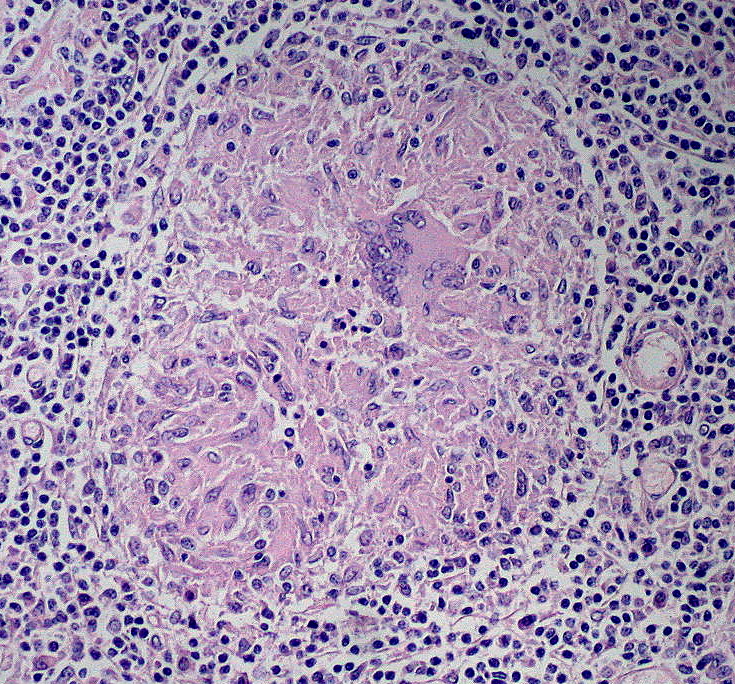Playlist
Show Playlist
Hide Playlist
Questions and Case Studies: Steroids, Cyclosporine and Crohn's Disease
-
Slides Inflammatory Bowel Disease Medication.pdf
-
Download Lecture Overview
00:01 Let's move on to some questions. Let's start with this one. Cyclosporine acts through the following mechanisms. 00:08 A, reduction of calmodulin. B, increasing the activity of calcineurin. 00:15 C, inhibiting the dephosphorylation of NFAT, with a reduction in interleukin 2. 00:22 D, increasing NFAT activity. Or E, increasing cytostatic activity? Which one is it? Good, C. Inhibiting the dephosphorylation of NFAT, with a reduction in interleukin 2. 00:42 So cyclosporine binds to cyclophilin to inhibit calcineurin from activity, which is to dephosphorylate nuclear factor of activated T-cells or NF-AT. Normally, calcineurin would cause increased transcription of your interleukin 2 and the cytokines. 00:58 Cyclosporine, therefore, reduces levels of interleukin 2 and some cytokines and T-cell activity. 01:04 Calmodulin is not affected by cyclosporine A. It has nothing to do with cyclosporine A. So A is incorrect. 01:12 Cyclosporine does not affect the activity of interleukin 2. It reduces transcription of interleukin 2. 01:19 So B is incorrect and C is correct. 01:22 D is incorrect because it's a direct contradiction of C. Cyclosporine decreases NFAT activity. 01:29 And finally, cyclosporine does not affect cytotoxic or cytostatic activity. Cytostatic activity, there is no such thing, it's a misnomer. So, remember that we are talking about cytotoxic activity. This was actually a question in one of the exams and it ended up getting thrown out because of the word cytostatic. 01:49 And they felt that they were trying to trick students. So the good news for you is, is that remember that no one is trying to trick you, but it's a very good question because you are going to be asked questions like this with cyclosporine, but without the tricks. 02:04 Let's try another question. Your 55 year old male patient has refractory inflammatory bowel disease. 02:11 The gastroenterologist has started the patient on oral steroids and cyclosporine. You saw him one month later. 02:19 Which of the following statements are true? A, the most feared short term adverse event is renal failure, as the metabolites are nephrotoxic. 02:31 B, feminizing features such as gynecomastia and loss of hair are common. 02:37 C, hypertension is rare, affecting less than 10% of the patient population on cyclosporine. 02:43 And D, the relative safety of cyclosporine is well known, with rare drug-drug interactions. 02:53 A is correct. The most feared short term adverse event is renal failure, as the metabolites tend to be nephrotoxic. 03:02 B is incorrect. Hirsutism and androgenic side effects are common. C is incorrect. Hypertension is common in cyclosporine use, with up to 50% of patients on cyclosporine A experiencing blood pressure over 150 systolic. 03:18 D is incorrect. There are 2000 to 3000 drugs that interact with cyclosporine, with very high rates of drug interactions. 03:26 It's advised to frequently check your cyclosporine levels each time a drug is added. An unknown number of herbal products will also interact with cyclosporine, so I recommend stop all herbal products and naturopathic products while on cyclosporine. 03:43 So this is a question I'd like to call, Luke: Imur-auntie! Luke is an 18 year old boy from Tatooine who wants to run off and join the academy. 03:52 Unfortunately, he suffers from Crohn's disease with explosive diarrhoea and fails the physical. 03:57 He is allergic to 5-ASA and wishes to try something stronger. The following statements are true except: Azathioprine or Imuran is a prodrug of 6-mercaptopurine. 04:11 B, azathioprine or Imuran prevents the production of purines in DNA. 04:17 C, azathioprine or Imuran may be used in children at lower doses. 04:23 And D, azathioprine or Imuran has no beneficial effects in patients with fistulizing complications of Crohn's disease. 04:32 Which of the following statements are false? So remember the question is asking, the following statements are true except. 04:40 Right, azathioprine has no beneficial effects in patients with fistulizing complications of Crohn's disease. 04:46 That is incorrect. 04:49 So azathioprine is actually a very effective medication in patients who have fistulizing disease. 04:55 The other statements are true and pretty much self-explanatory. And for your own information Luke was started on Imuran, and his health improved, but he never did attend the Academy. He ended up rebelling and caused his father great irritation. 05:09 Let's move on to another question. A 32 year old women presents with a history of intermittent diarrhoea and right lower quadrant pain. She was seen by a nurse practitioner two years ago, who had started her on prednisone 40mg/day and Tylenol. She is now hypertensive, she has a typical "moon face" and has developed some osteoporosis. 05:32 You diagnose Crohn's disease of the ileocecal region. What would be an appropriate strategy? Would you A, stop the prednisone immediately, and start a delayed release 5-ASA product and continue the Tylenol? Would you B, stop the prednisone and Tylenol immediately, and start a delayed release 5-ASA product? Would you C, taper off the prednisone, and start a delayed release 5-ASA product? Or D, would you taper off the prednisone, start an Azo-5-ASA product in an enema formulation? Good, you chose C. So let's go over the choices. Targeting the active lesions is an art that requires you to understand the interplay between physiology, pathology, and chemistry. An enema, no matter how effective, will not travel to the ileocecal region. Azo-5-ASA products are often used in colonic and ileocecal disease. 06:33 Now prednisone, is a clumsy tool in first line treatment of this kind of disease. And it's often the strategy of practitioners who are either desperate or incompetent. Because she has been on prednisone for so long, her adrenal axis is now suppressed, or possibly permanently damaged. So we need to taper off the prednisone gradually and very very carefully. 06:56 Tylenol is a reasonable pain medication, and hopefully will no longer be needed. The correct answer is going to be C. 07:03 Well that's it. I know you're going to do well on your exam. Show them what you know.
About the Lecture
The lecture Questions and Case Studies: Steroids, Cyclosporine and Crohn's Disease by Pravin Shukle, MD is from the course Gastrointestinal Pharmacology. It contains the following chapters:
- Question: Cyclosporine Forum
- Case Study 1: Steroids and Cyclosporine
- Case Study 2: Crohn's Disease
- Case Study 3: Crohn's Disease Medication
Customer reviews
5,0 of 5 stars
| 5 Stars |
|
1 |
| 4 Stars |
|
0 |
| 3 Stars |
|
0 |
| 2 Stars |
|
0 |
| 1 Star |
|
0 |
I used to think Dr. Raj was far and away the greatest medical educator alive. I didn't even watch anyone else. I used Lecturio just for Dr. Raj's videos. Dr. Raj is funnier, and perhaps more memorable. However, Dr. Shulke presents the same level of clear, concise explanations, the kind that only come from the mind of a master who has internalized the material to the point of making it look easy. I love the part where Dr. Shulke boldly calls prednisone a clumsy tool for incompetent practioners. That is with me forever. I feel bad for my classmates struggling through our professors' awkward lectures. .





